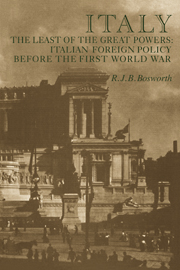Book contents
- Frontmatter
- Contents
- Dedication
- Preface
- List of maps
- 1 Society and politics in Liberal Italy
- 2 New political pressure groups and foreign policy
- 3 The making of a Foreign Minister: Antonino Di San Giuliano
- 4 The Consulta: the bureaucrats of foreign policy
- 5 How Italy went to Libya
- 6 How Italy stayed in Libya
- 7 The politics of alliance: Italy in the Triple Alliance, 1912–1914
- 8 The politics of friendship: Italy, the Triple Entente, and the search for a new Mediterranean agreement, 1911–1914
- 9 ‘Un cliente maleducato’: Italy in the Dodecanese and Ethiopia, 1912–1914
- 10 Preparing to digest some spoils: Italian policy towards Turkey, 1912–1914
- 11 San Giuliano's epilogue. The realities of European war 28 June to 16 October 1914
- Conclusion
- Appendix I The Ten Commandments for Italians abroad
- Appendix II Pro-memoria on our politico-military situation, by A. Pollio
- Appendix III San Giuliano's poem about his funeral ceremony
- Abbreviations used in the notes and bibliography
- Select bibliography
- Notes
- Index
1 - Society and politics in Liberal Italy
Published online by Cambridge University Press: 16 November 2009
- Frontmatter
- Contents
- Dedication
- Preface
- List of maps
- 1 Society and politics in Liberal Italy
- 2 New political pressure groups and foreign policy
- 3 The making of a Foreign Minister: Antonino Di San Giuliano
- 4 The Consulta: the bureaucrats of foreign policy
- 5 How Italy went to Libya
- 6 How Italy stayed in Libya
- 7 The politics of alliance: Italy in the Triple Alliance, 1912–1914
- 8 The politics of friendship: Italy, the Triple Entente, and the search for a new Mediterranean agreement, 1911–1914
- 9 ‘Un cliente maleducato’: Italy in the Dodecanese and Ethiopia, 1912–1914
- 10 Preparing to digest some spoils: Italian policy towards Turkey, 1912–1914
- 11 San Giuliano's epilogue. The realities of European war 28 June to 16 October 1914
- Conclusion
- Appendix I The Ten Commandments for Italians abroad
- Appendix II Pro-memoria on our politico-military situation, by A. Pollio
- Appendix III San Giuliano's poem about his funeral ceremony
- Abbreviations used in the notes and bibliography
- Select bibliography
- Notes
- Index
Summary
The political and military leadership in the Risorgimento … said that they were aiming at the creation of a modern State in Italy, and they in fact produced a bastard. They aimed at stimulating the formation of an extensive and energetic ruling class, and they did not succeed; at integrating the people into the framework of the new State, and they did not succeed. The paltry political life …, the fundamental and endemic rebelliousness of the Italian popular classes, the narrow and stunted existence of a sceptical and cowardly ruling stratum, these are all the consequence of that failure. A consequence of it too is the international position of the new State, lacking effective autonomy because sapped internally by the Papacy and by the sullen passivity of the great mass of the people.
So, with justifiable anger, Antonio Gramsci scribbled into his Prison Notebooks the now classical definition of the foundation of modern Italy, of a process of unification which had brought political but not social change, of a boasted ‘national revolution’ which was really a rivoluzione mancata, of an Italy of transformism where ‘If we want things to stay as they are, things will have to change.’
For it had not been by intellectuals, attracted by the ideas of Mazzini and Pisacane, nor peasants moved to rebellion by the ‘Imperishable Heroism’ of Garibaldi that Italy had been united, but by strategems in the field of diplomacy and war, that is by an exploitation of the ‘artichoke’, one leaf at a time, policy of dynastic expansion by Piedmont under the leadership of Cavour.
- Type
- Chapter
- Information
- Italy the Least of the Great PowersItalian Foreign Policy Before the First World War, pp. 1 - 38Publisher: Cambridge University PressPrint publication year: 1979

